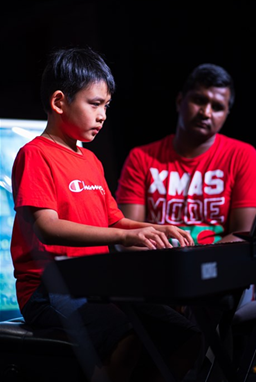.gif)
Introduction To Piano Playing: A Beginner's Guide to Starting Piano Lessons
Friday, July 26, 2024 by Shaun Premnath | Uncategorized

Learning to play the piano is a rewarding experience that blends practical proficiency with enjoyment of music. Beginners may find the world of keys, notes, and melodies difficult, but with the right attitude, anyone can begin creating beautiful music. The goal of this blog is to provide newcomers the knowledge they need to start piano lessons off successfully.
Selecting the Appropriate Piano:
Starting piano instruction starts with choosing a suitable instrument. Digital, upright, and grand pianos are available. Grand pianos are noted for their great sound despite their high cost and space requirements. Beginning students often choose upright pianos because they are more reasonably priced and smaller. For students, digital pianos are flexible and provide tools such as volume control and varied sound settings.
Organising Your Practice Area:
Effective learning depends on a certain practice space being created. Make sure your piano is in a peaceful spot, free of most distractions. Reading sheet music and keeping the correct posture depend on good illumination. A good bench at the appropriate height will help to prevent strain and help to keep proper hand position.
Reading a Sheet Music Book:
Any pianist must first learn to read sheet music. Sheet music offers a graphic picture of the required notes and rhythms. Learning the foundations of music notation—including the staff, clefs, and note values—beginners should start here. Over time, practise reading easy pieces to hone this ability.
Fundamental Piano Methods:
Long-term development depends on the early development of effective piano techniques. Essential elements of piano performance are correct hand position, finger movement, and posture. Exercises strengthening finger independence and talent should be the main emphasis of beginners. Excellent for laying a strong technical basis are simple scales and arpeggios.
Consistent Practice:
Learning to play the piano requires consistency above all else. Regular daily practice sessions enable the development of muscle memory and strengthen knowledge. Start with brief practice sessions and progressively extend the time as your ability grows. Combine several workouts and pieces to keep practice sessions interesting and efficient.
Discovering Various Musical Styles:
The capacity to investigate several musical genres is one of the pleasures of learning to play the piano. From classical and jazz to pop and rock, the piano is a flexible instrument able to fit various genres. Diverse genre experimentation helps you find your musical tastes and makes practising more fun.

Utilising Apps and Online Resources:
The internet era has produced several tools and resources to help with piano learning. For beginners, online lessons, instructive movies, and interactive apps offer extra help. These instruments provide fresh approaches to learning and practice as well as increase traditional teachings.
Locating a Piano Teacher:
Although self-learning is possible, having a piano tutor will greatly improve your learning process. An instructor can give ordered instruction, rectify errors, and individualised directions. Search for a certified teacher who can modify their approach to fit your learning speed and has a background working with beginners.
Joining a Music Community:
Joining a music community can inspire and help one. Online forums, community centres, and local music schools provide chances to meet other piano learners. Engaging in group lessons, concerts, and recitals will improve your educational process and offer insightful criticism.
Establishing Objectives and Celebrating Development:
Maintaining drive and tracking development depend on having reasonable goals. Sort your study goals into smaller, doable chores. To keep your excitement strong, celebrate achievements and benchmarks. Whether you're learning a new piece or working on your technique, keeping inspired depends on your ability to see development.
Managing Obstacles:
Learning to play the piano has several difficulties. Especially in trying circumstances, one should be patient and tenacious. Divide difficult works into smaller chunks, and never hesitate to ask your teacher or internet resources for assistance. Recall that every pianist encounters challenges, so part of the learning process is conquering them.
Finding Your Style:
As you advance, give special attention to honing your expression and style. Experiment with tempo, phrasing, and dynamics to match your playing to your personality. This uniqueness lets you really relate to your audience and determines music.
Conclusion:
Starting piano lessons is a fascinating and rewarding path. Anyone can learn to play this wonderful instrument with the correct technique, commitment, and tools. Beginning players can create a firm basis for their musical journey by selecting the appropriate piano, arranging a suitable practice area, learning fundamental methods and consulting a teacher. Accept the difficulties and acknowledge your development. Join Learn Music with Shaun to improve your piano learning experience and get individualised advice and support.
